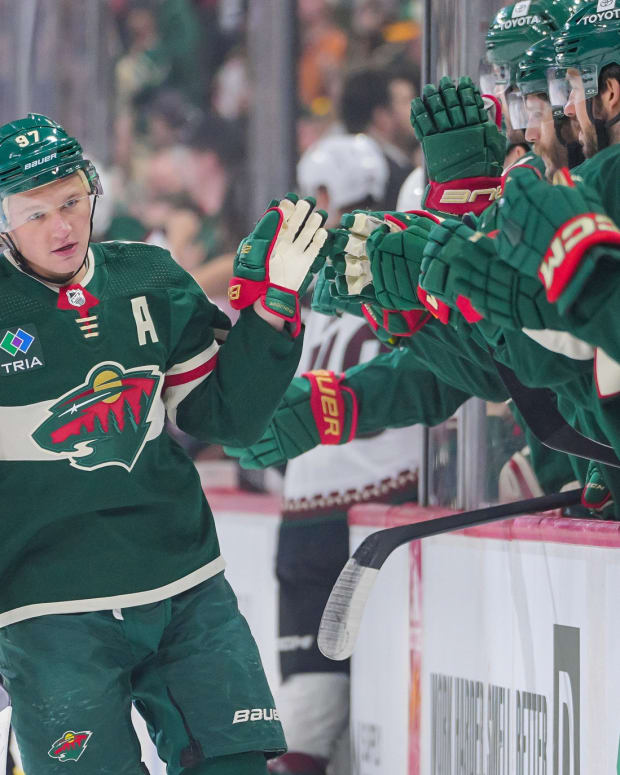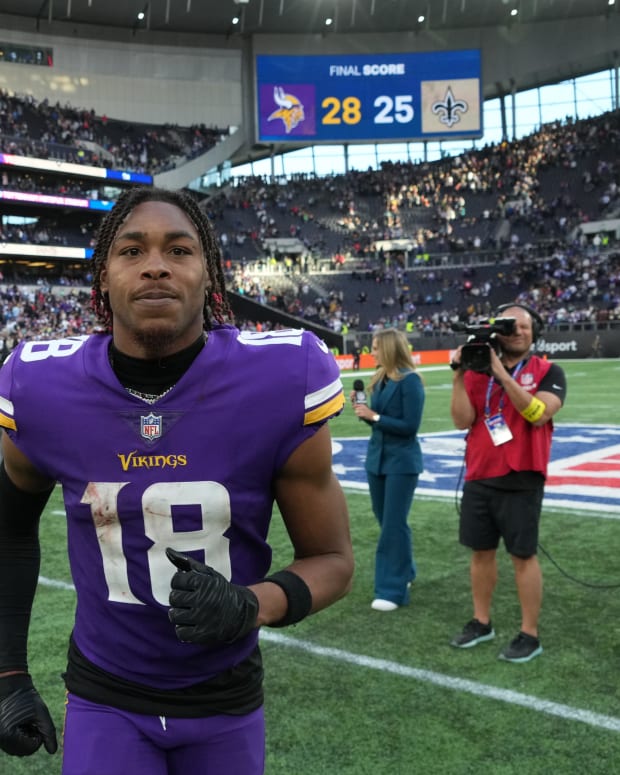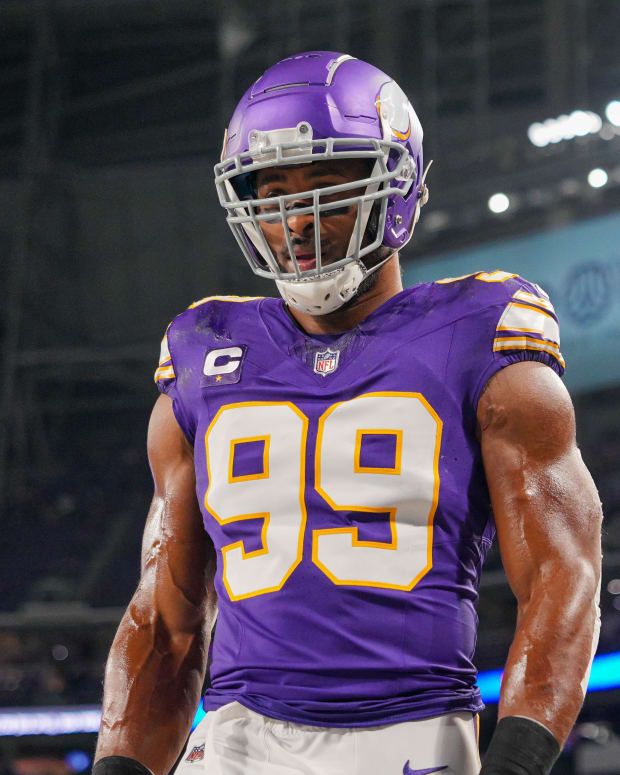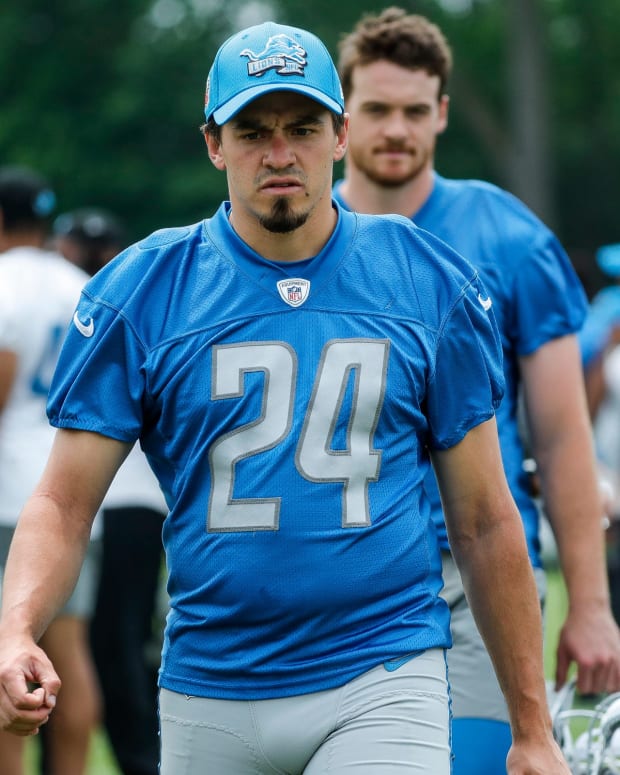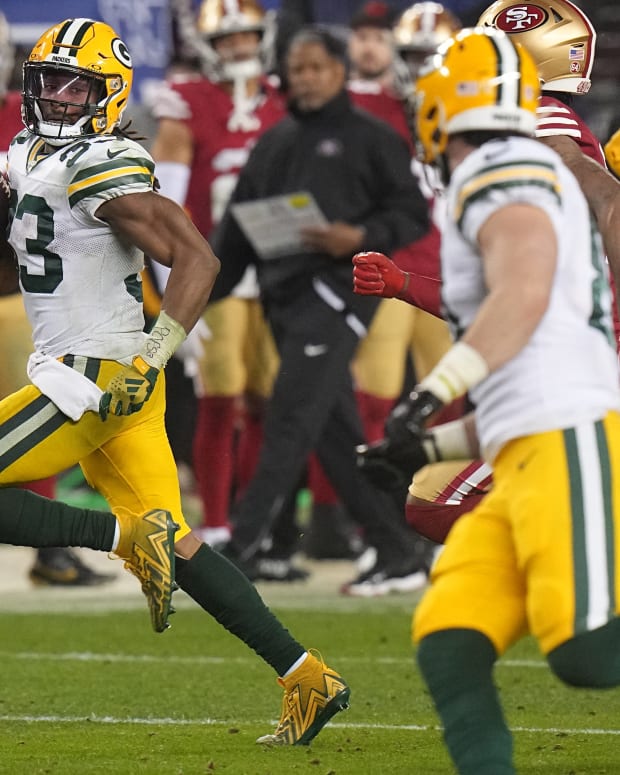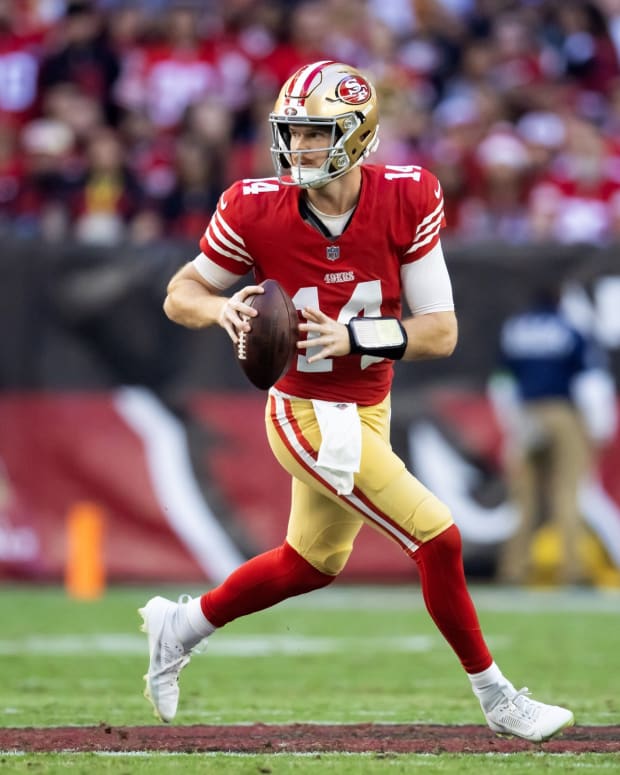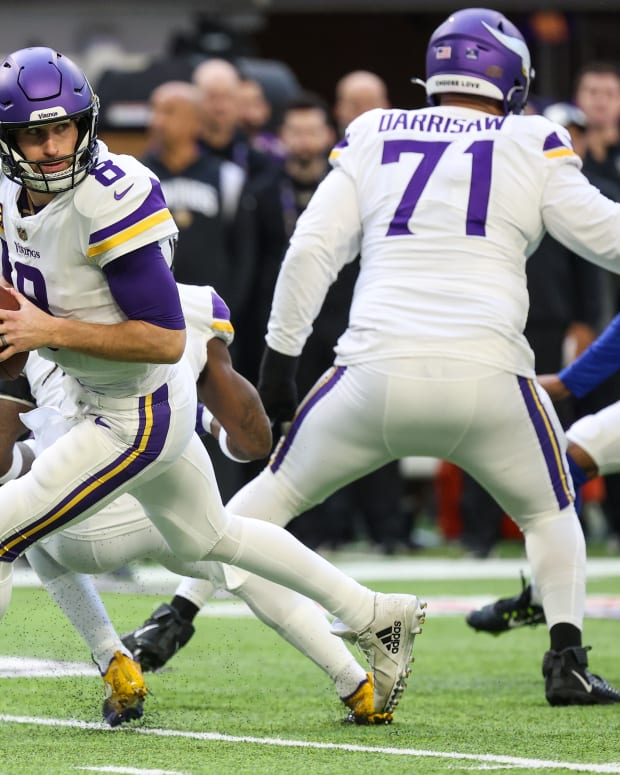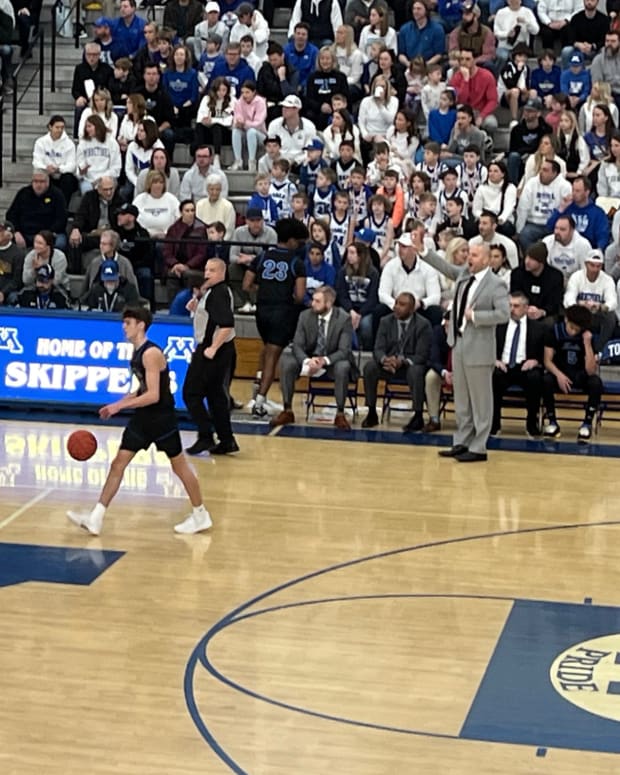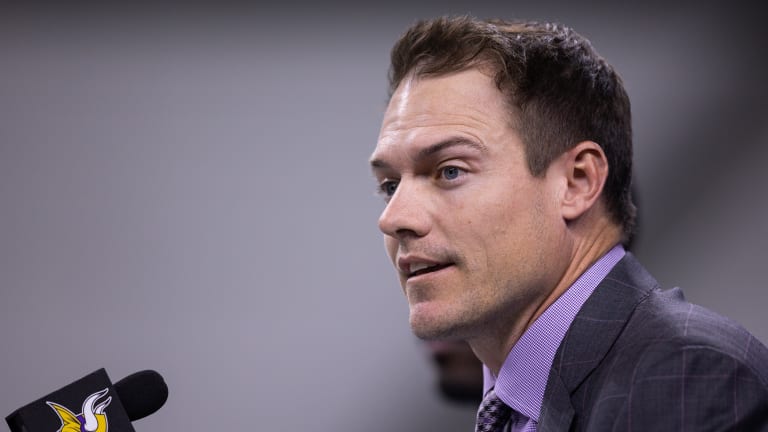
Takeaways from Kevin O'Connell's introductory press conference

More than five weeks after ownership set in motion a whirlwind general manager and coach search when they fired Rick Spielman and Mike Zimmer, Mark and Zygi Wilf sat and watched their new GM Kwesi Adofo-Mensah introduce their new head coach Kevin O’Connell to the local media.
It had to be a sigh of relief for the Wilfs to have the ordeal in the rearview mirror. After all, in the month and change that the search took, the Vikings ostensibly got one-upped by the Chicago Bears on a strong GM candidate in Ryan Poles, went far down a path with Jim Harbaugh that fell apart for reasons that remain ambiguous, and even had to sweat the rumors of Sean McVay leaving for a lucrative TV deal and tempting O’Connell to stay in L.A.
The end result, though, had to be pretty satisfying on Thursday afternoon.
Both eventual selections resoundingly won their opening press conferences with honesty, candor and talk of collaboration. O’Connell, in particular, owned Thursday’s festivities with confident rhetoric, a smile that could serve as an Invisalign ad and the afterglow of a Super Bowl win — a victory the Wilfs were rooting for as they watched from home.
“It was great to be along his journey winning it,” said Zygi Wilf. “I saw in him the ability to come and do the same thing here. That was very exciting to see him come to that final goal that he's always been reaching for. And I think with the group that we have here we can do that.”
O’Connell spoke on the record for a half an hour Thursday afternoon, giving fans a look into his coaching philosophies and a preview of both sides of the ball. Here were the major takeaways:
Commitment to Kirk could’ve been stronger
At face value, the words that came out of the mouths of O’Connell and Adofo-Mensah were pro-Kirk Cousins, but the absence of certain phrases that ensured his inclusion or endorsed him as a long-term answer spoke volumes, too.
The second question of the press conference asked O’Connell to address Cousins’ future. While O’Connell waded into some vague statements about building an offense that suits Cousins’ style, he kept his comments mostly generic and planted firmly in the present without addressing Cousins’ contract situation.
“I think Kirk has played at a very high level, and he's done a lot of really good things throughout his career,” O’Connell said. “I know who he is as a player, and I know what he's capable of, and part of our job as coaches is maximizing a player's ability to go out every single Sunday and have success. I feel that's going to be an advantage for us as we build our system offensively, make sure we really focus on the things Kirk does well, which I do think are a lot of aspects of playing the position, and help him on a daily basis connect with his team, lead us, be a completely quiet-minded quarterback that can go play because he's talented enough to go do that, putting him in the best possible situations to have success.”
O’Connell was then asked more directly if Cousins was the 2022 quarterback.
“Well, I know he's already contract and I'm excited to coach him,” O’Connell said. “We've already started thinking about how we're going to build those systems for him and our other quarterbacks and really the tremendous skill group that we have, our guys up front. It takes all 11 to move the football on offense, to run it, to throw it, to score points in the red zone. But I'm anticipating Kirk being a part of what we do.”
Pointing to Cousins’ official contract status instead of squashing any conjecture leaves the door wide open for the Vikings to make a move. Since Cousins is under contract, it’s entirely possible he could return, but the lack of a firm endorsement should tell us that the Vikings are at least considering fielding offers.
O’Connell was also asked to compare Cousins to Matthew Stafford, who just earned him a Super Bowl ring in Los Angeles. O’Connell pointed to the fact that both were “elite throwers.”
“Accuracy is the number one requirement in this league as a quarterback from a physical standpoint,” O’Connell said. “We can talk a lot about makeup and obviously the ability to process at the line of scrimmage and play fast, but if you can't be accurate with the football, it becomes very difficult to consistently move the ball for an offense. I think Kirk, the one thing I've always noticed about him is he's incredibly accurate with the football. He plays with great rhythm and timing and precision, and I think we can build an offensive system like we had in LA to take advantage of that skill set.”
O’Connell to call the plays, incorporate principles from L.A.
Though the Vikings have yet to name an offensive coordinator, O’Connell declared that he would be calling plays, in step with most young offensive coaches around the league. It will be his first time doing it in a full-time role, but O’Connell got practice calling preseason games in L.A. and also had a voice in regular season play-calling decisions.
“I've used this joke before, but my career as a player provided a great platform for me as a coach because I did spend a lot of time watching games from the sideline,” said O’Connell, who was consistently self-deprecating about his short playing career.
O’Connell spoke highly of McVay, who served as a mentor to him in Los Angeles during O’Connell’s two years as his offensive coordinator. McVay’s offense has been characterized in his five seasons by frequent motion, three-receiver formations and heavy play-action usage.
“I feel like I've been around one of the best play callers in the NFL over the last couple years, and obviously the system we run here will have a lot of characteristics of what we did in Los Angeles,” said O’Connell, “the ability to have that attacking mindset, the ability to utilize our offense at the line of scrimmage.”
It’s likely O’Connell incorporates more tight ends than the Rams did, especially without the type of pass protectors he enjoyed with the Rams, but it should be a drastic shift from the run-first style the Vikings have promoted for years.
What’s in store for the defense?
The Vikings also announced the bulk of their coaching staff Thursday, which included defensive coordinator Ed Donatell, the 65-year-old previously with the Denver Broncos.
O’Connell confirmed that Donatell will be running a base 3-4 defense, but just as the old 4-3 was only seen on obvious rushing downs, the 3-4 will also change when defenses go into the nickel. O’Connell says his main emphasis is being multiple in his defensive looks, something the Vikings did more of last season under Mike Zimmer.
“I think depending on the defense you talk to, 81 percent of the time they're in nickel defense,” O’Connell said, “which essentially is just a 4-3 with a a fifth DB in the game instead of a third linebacker. A lot of times a big thing ... is being multiple with your fronts because I know as an offensive coach if we know where you're going to be, we know where you're going to line up, that makes it pretty easy at least to design things to attack angles, understand how you want to run the ball, how you want to protect.
"But when you're changing that picture and forcing opponents to deal with multiple fronts during a game, during a drive in some cases, that can be a real weapon for a defense, pairing that with some really good things on the back end, that's kind of what we're hunting.”
The Vikings defense has ample work to do to improve from last year’s group that was 30th in yards allowed, and they’re losing numerous starters to free agency. O’Connell still pointed to a couple of stalwarts he’s excited about and one pending free agent in Anthony Barr who may not be around.
“I see impactful players at all three levels, I really do, starting in the back end with Harrison Smith,” O’Connell said. “I think he's the perfect player for the defensive structure we want to play from the standpoint of the coverage, how we want to make all things look the same. He's got great length. He's got great instincts. He's going to be a problem for people in the middle of the field and around the line of scrimmage. He really always has been, speaking from experience.
“Obviously with the linebackers, with Eric Kendricks and Anthony Barr, those guys have long since been huge issues in this league for people defensively. I think there's ways to use those guys and allow them to play with an attacking mindset while they're still responsible for the things that they're responsible for defensively.”
Curiously, O’Connell didn’t mention Danielle Hunter by name as the team approaches a major contract impasse with the star edge rusher.
And as far as “core characteristics” of the defense, O’Connell isn’t reinventing the wheel.
“First and foremost, the core characteristics of playing good defense, which is guys flying around, a great tackling group,” he said. “We're going to force turnovers with how we play from a scheme standpoint, but that's an effort thing. That's playing with great effort, sustaining that, finishing plays, making it about the football.”
Ready to win right away?
The Wilfs were adamant on the day Zimmer and Spielman were fired that they expected competitiveness in 2022. Now that they’ve hired their GM and head coach, they’ve continued to echo that sentiment, leaving no low bars to clear for the new regime.
“For 2022, for sure, we’re going to be super competitive,” Mark Wilf said confidently. “Sustained success is the goal, and I think we have it with this leadership.”
It doesn’t make sense for the owners to declare a complete teardown, but it’ll be curious to see if their declaration influences any of the front office’s offseason decisions. There are plenty of tradable assets on the Vikings roster in addition to Cousins, but those are also assets that could get the team in the hunt once again in the month of December, even if the Vikings aren’t a legitimate Super Bowl threat.
“I think there's a lot of reasons on both sides of the ball that make me really excited about implementing the systems and the processes that we're going to implement that these guys can then take and run with as players,” O’Connell said. “Can't wait to see the leadership of this group. I think there's great leadership on this team already.”
A place for the running game
Even the most infrequent rushing team last season still rushed the ball 22 times a game, so as passing attacks continue to take over NFL offenses, the running game isn’t going away. O’Connell was asked for his view on that evolution.
“You don't play against every opponent the same way,” he said. “You've got your core foundational aspects of your offensive system. The run game and how you run the football is certainly a huge part of that, and you want to be able to, as you said, impose your will. You want to be able to run the football because there's going to be times you have to, the way defenses want to defend your pass game. We use the term they're daring us to run it. We've got to be able to do it. We've got to be able to move people up front. We've got a really, really good running back here that we've got to put him in positions to use his skill set and have a lot of success, and I feel really, really good about a plan to do that.”
That “really, really good running back” is Dalvin Cook, who is signed through 2025. Under O’Connell, Cook may see a dip in workload but possibly an increase in efficiency if he stays healthier, and perhaps O’Connell can invigorate Cook in the screen game again. The only play-caller that got a lot out of Cook through the air was Kevin Stefanski in 2019 when Cook had over 500 yards receiving.
O’Connell used a common Stefanski term on Thursday, referring to the “marriage” between the run and the pass.
“Running the football and the marriage with the right kind of pass game is what makes an offensive system what it is,” he said. “We've talked about that term ‘illusion of complexity.’ You've got to be able to do both. You've got to have balance because if defenses have to defend both things and they don't know it's either-or until long after they would like, we've got an advantage right there to go do a lot of things on that particular snap that will help us go score points on that drive.”
Using analytics
O’Connell had a proverbial cup of coffee with the San Francisco 49ers when Adofo-Mensah was still fairly far down the pecking order with the organization, so he was familiar with the GM’s analytical approach when he joined the Vikings.
When asked about his use of analytics and how it might mesh with Adofo-Mensah’s, O’Connell gave a far different answer than the previous head coach, who typically frowned upon new-age data.
“I think it's an incredible tool that we have at our disposal,” O’Connell said. “It's a weapon if it's used the right way, but you've got to have people to help you. I think when you're a football coach the number one thing sometimes that can be a challenge is dealing with too much information sometimes, and we've already had great dialogue about that. He's got a great way about presenting that information. He's had success doing it to some really, really great football coaches he's worked with, but presenting that information in a way where it can be used as a winning edge for an organization, and when we can collaborate and work together using the tools that we'll have, and analytics definitely is going to be one of them, I think we can be the best possible version of the Minnesota Vikings that we can be, combining that with some of the other things that we'll want to do as an organization.”
